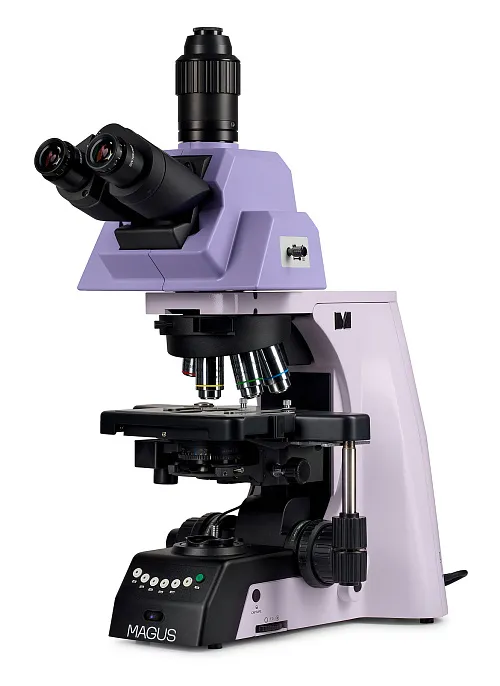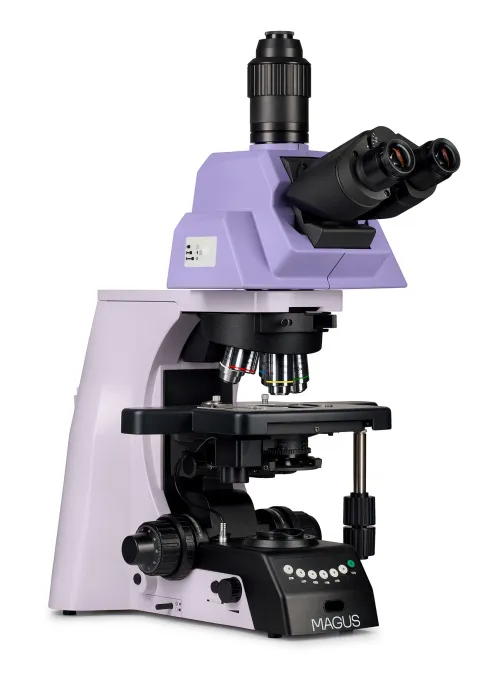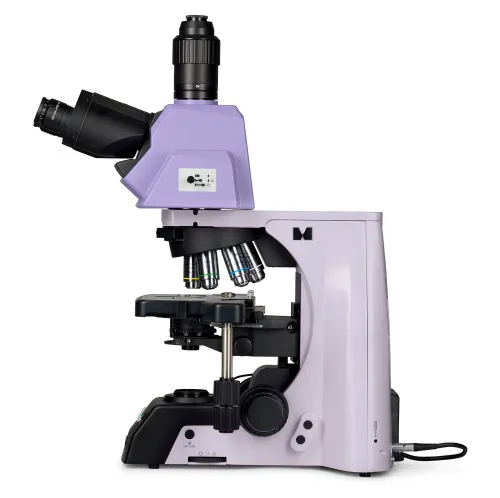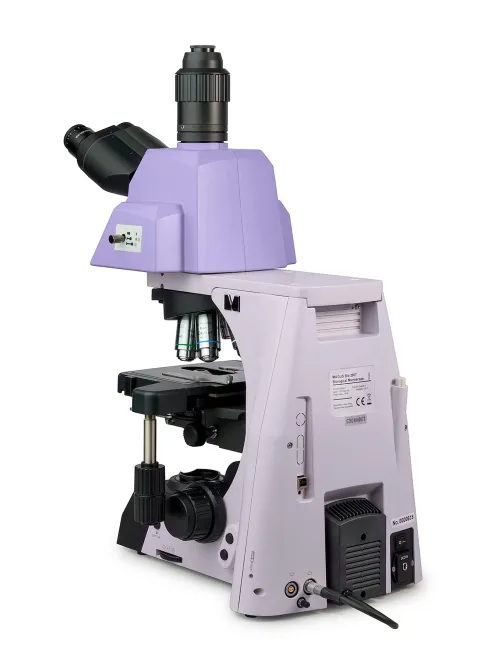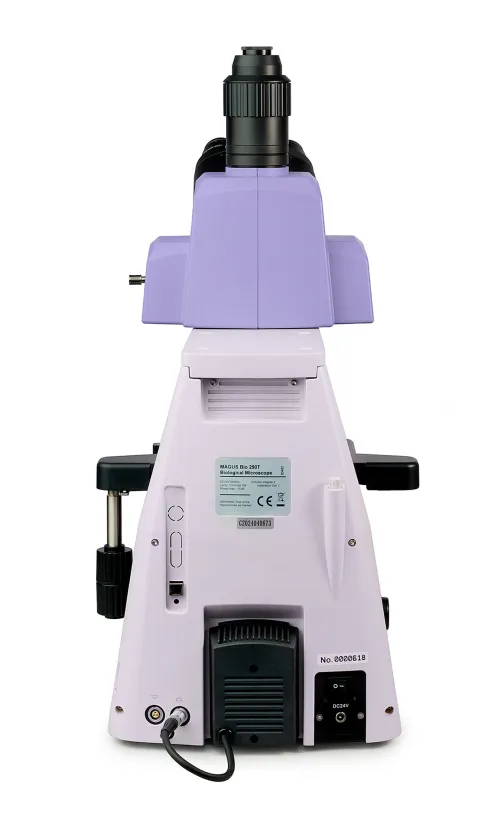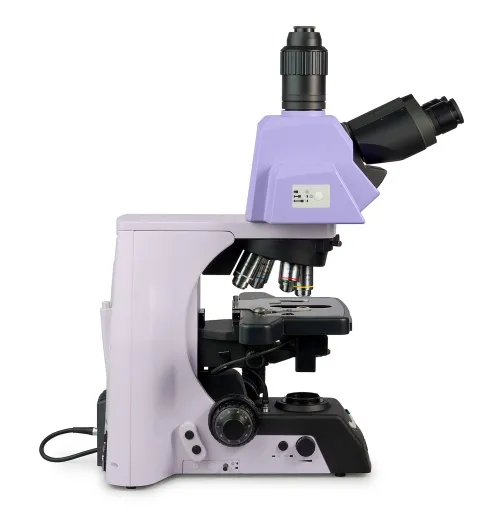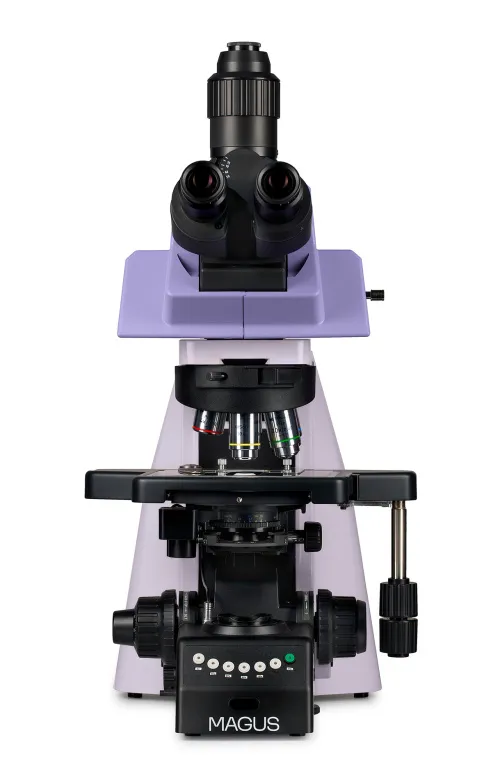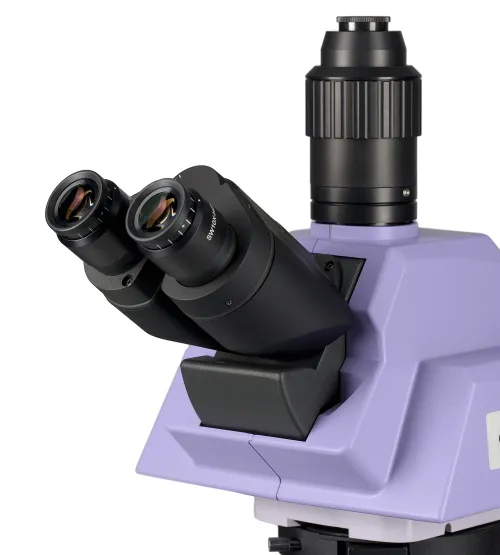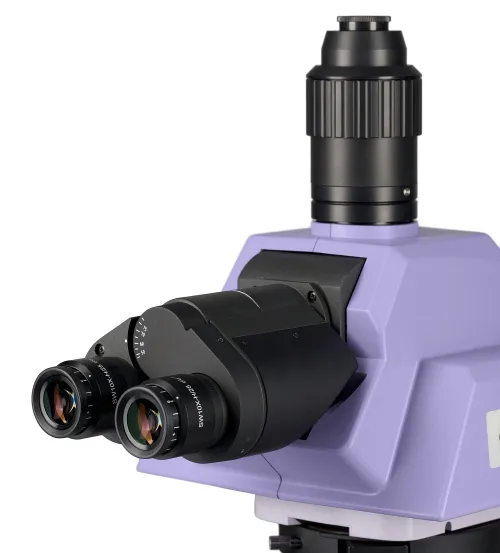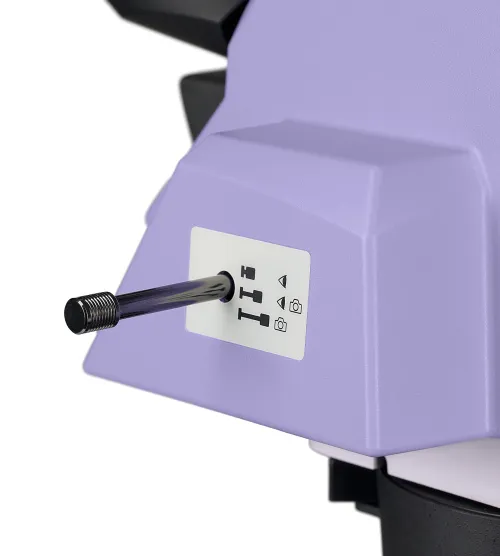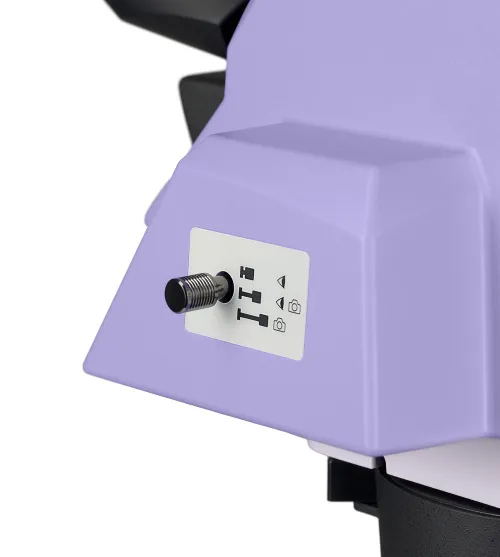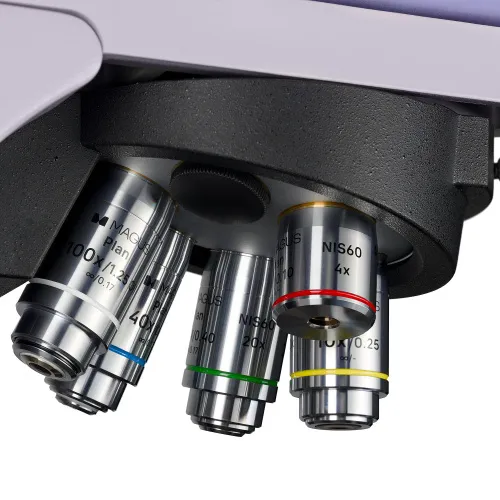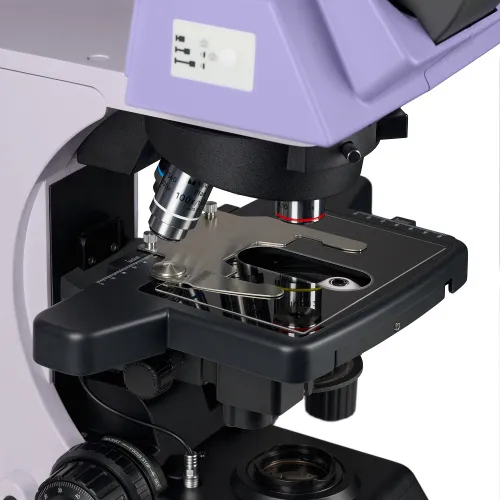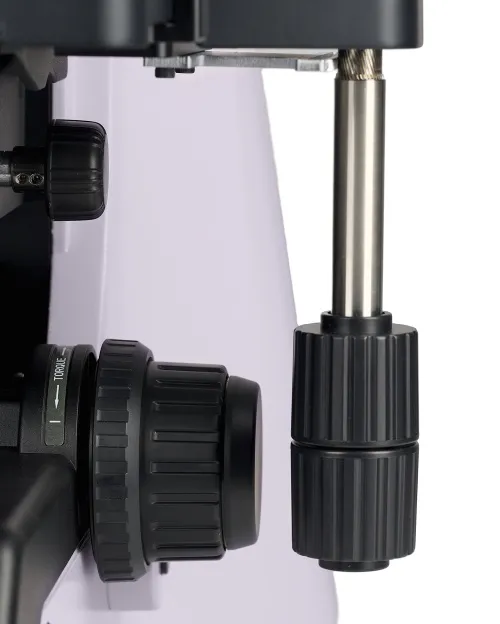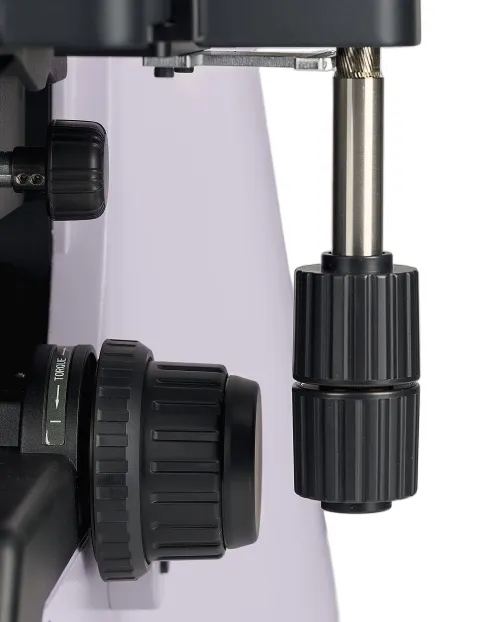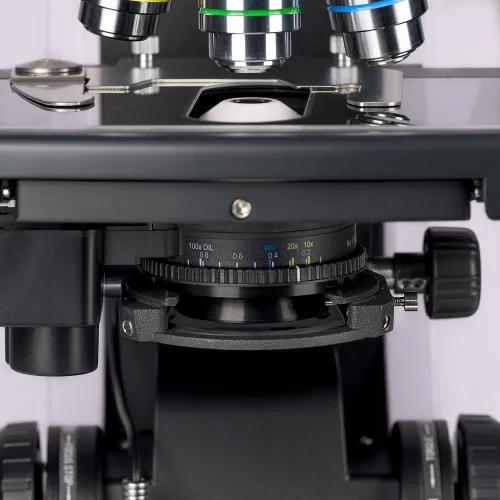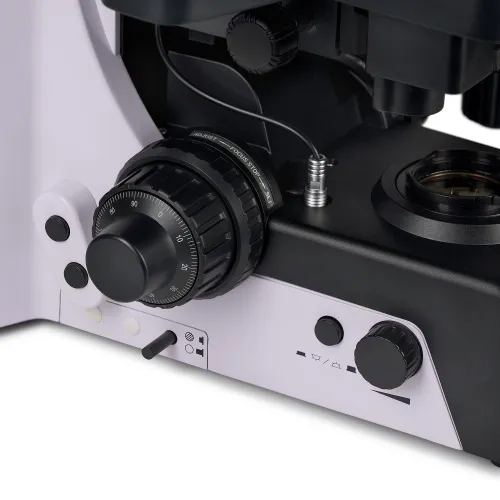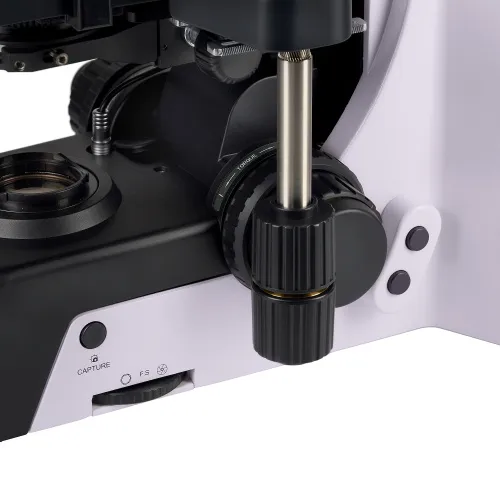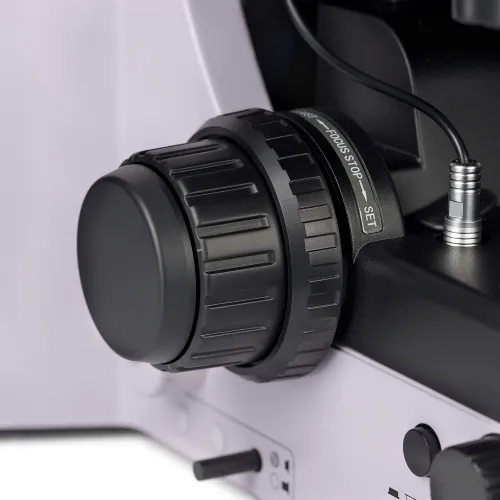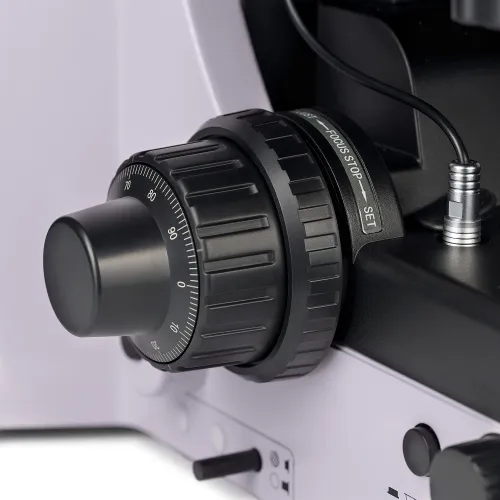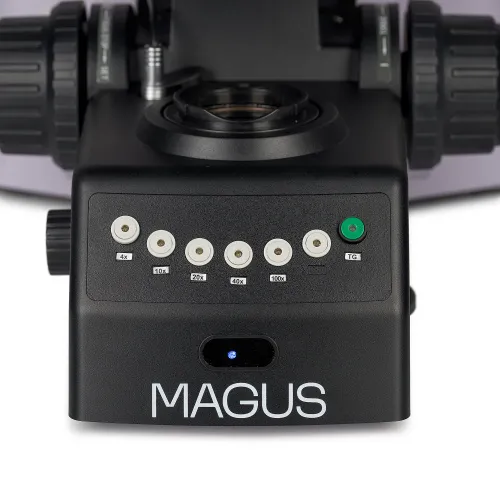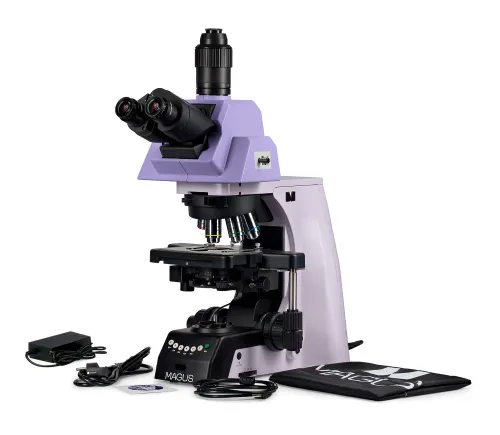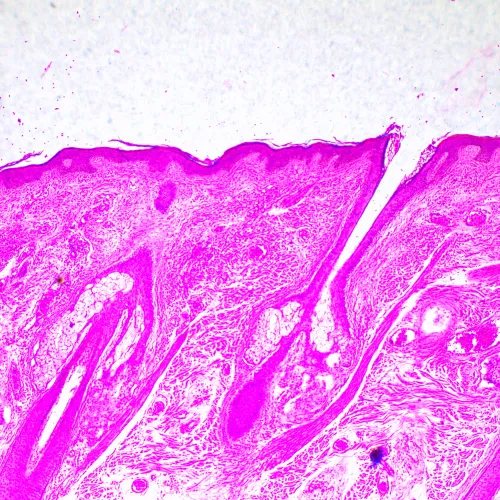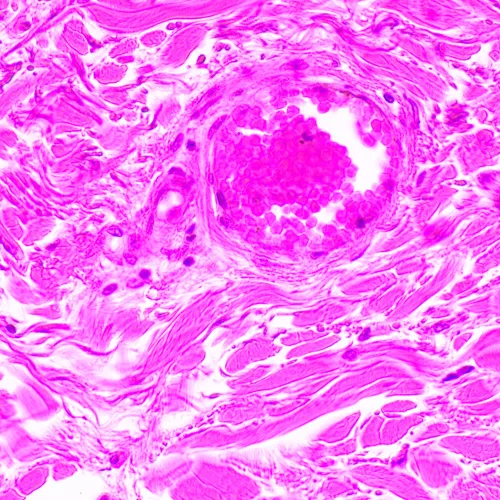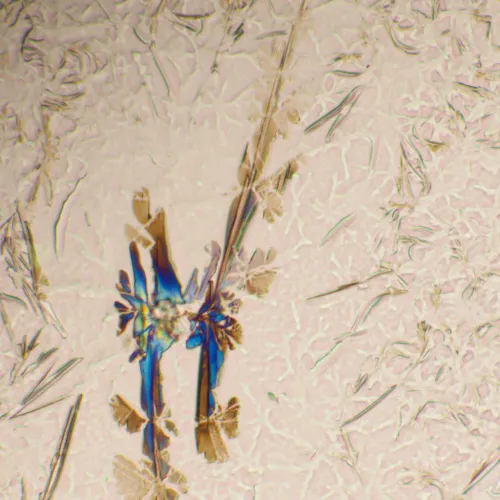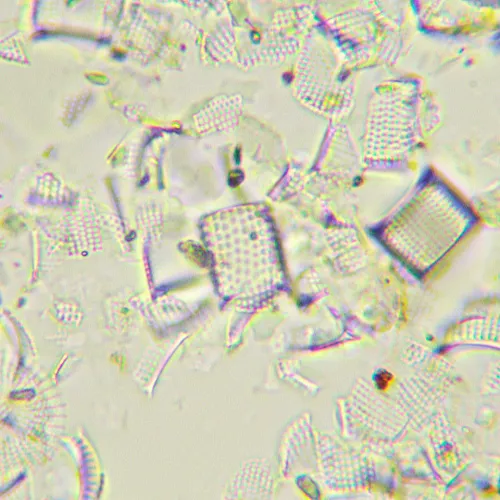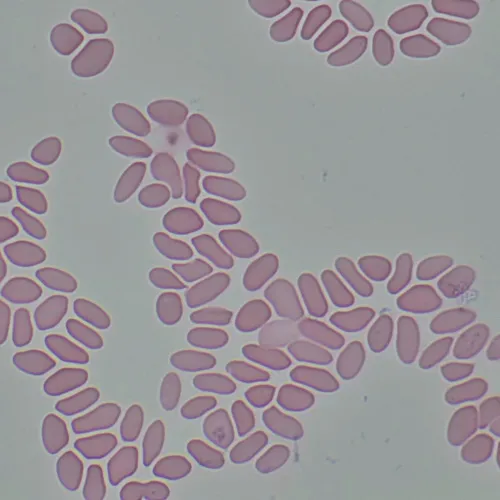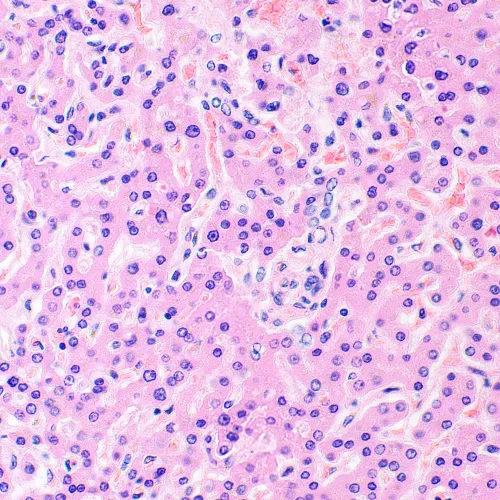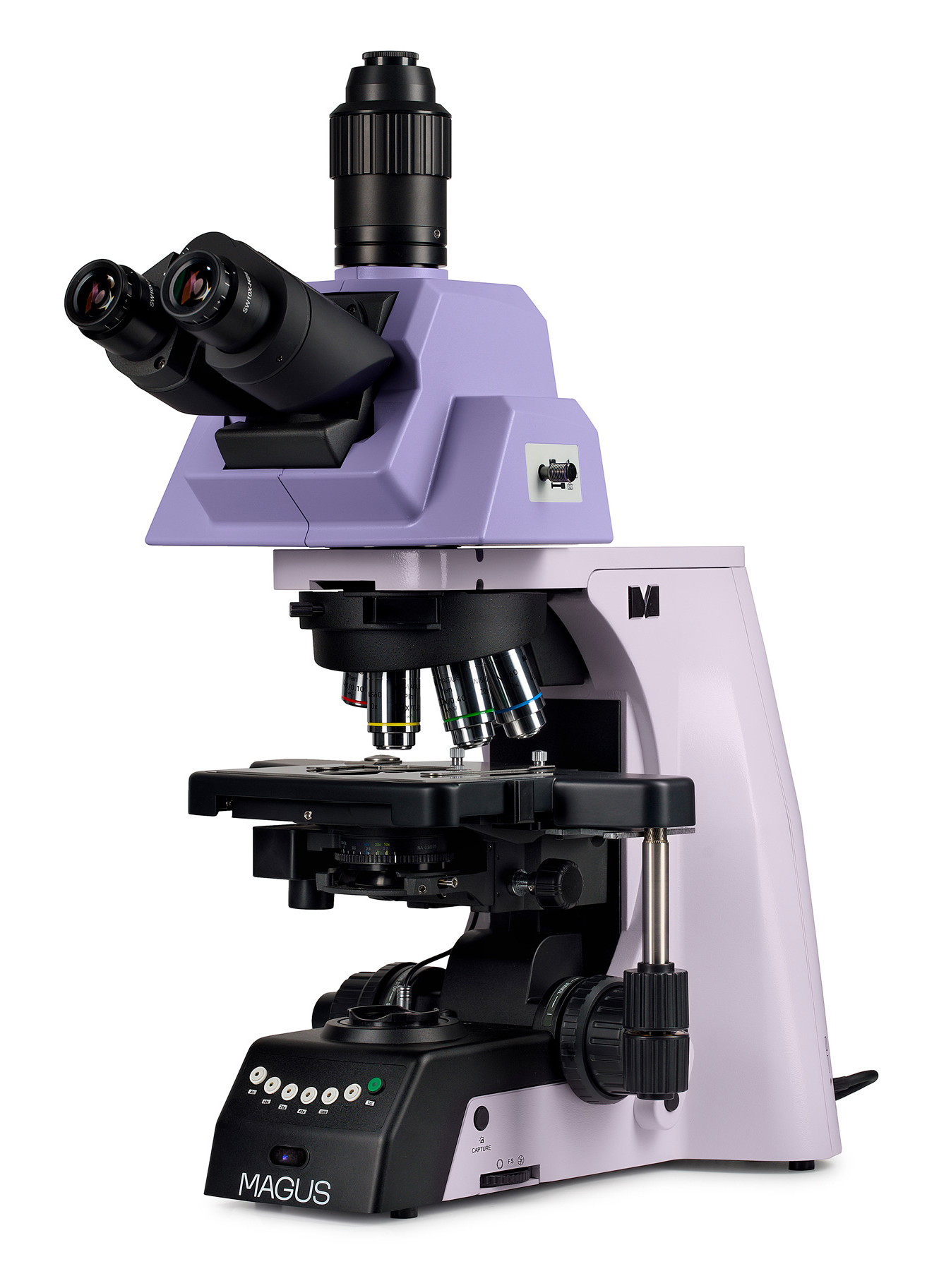MAGUS Bio 290T Biological Microscope
Magnification: 40–1000x. Trinocular head with adjustable tilt angle, motorized revolving nosepiece and condenser, plan achromatic objectives, 3W LED illuminator, intelligent lighting control system
| Product ID | 83482 |
| Brand | MAGUS |
| Warranty | 5 years |
| EAN | 5905555019482 |
| Package size (LxWxH) | 78x56x57 cm |
| Shipping Weight | 21 kg |
Research grade microscope. Designed for observing transparent and translucent biological samples, such as smears and cross sections in transmitted light using the brightfield method. Installation of additional accessories will allow for darkfield, phase contrast, differential interference contrast, fluorescence, and polarization methods.
The motorized revolving nosepiece and condenser automate the process of switching objectives and adjusting the lighting system for each one. The user is not distracted by the settings and, therefore, their attention is focused on the research at hand and that accelerates the activity.
The microscope is suitable for microbiological analysis, medical diagnostics, and solving scientific and research problems.
Microscope head
Trinocular head with infinity-corrected optics. The user selects the most comfortable angle of inclination of the microscope head in the range of 0° to 35°. The digital camera is mounted in the trinocular tube. The beam splits 0/100, 100/0, or 80/20.
The base kit includes 10x/25mm eyepieces with diopter adjustment and a long eye relief for working with glasses.
Revolving nosepiece and objectives
A motorized revolving nosepiece for 6 objectives is oriented toward the interior: The user sees the objective inserted into the optical path, and the space above the stage is free. An additional objective can also be installed in the free slot in order to achieve extra magnification. The objectives are plan achromatic, parfocal height – 60mm.
Above the nosepiece is a slot with a plug for installing an analyzer, compensators, or differential interference contrast sliders.
Remote control of the revolving nosepiece
The front panel of the microscope has objective selection buttons. By pressing a button, the revolving nosepiece automatically sets the selected objective to its working position. A separate button is used to switch between the two most commonly used objectives.
On both sides of the body, next to the focusing knobs, there are buttons for rotating the nosepiece.
The lighting and condenser position are automatically adjusted to match the selected objective.
These features improve user comfort, speed, and efficiency. They provide an advantage for microphotography as the shooting conditions remain the same for each sample.
Maintaining comfortable brightness levels when switching magnifications
The objectives of different magnifications transmit light with different levels of intensity, and so each time you change objectives, the brightness of the light must be adjusted. In addition, brightness sharply increases when switching from a higher magnification objective to a lower magnification one. A sharp increase in brightness causes eye fatigue. MAGUS Bio 290T is equipped with intelligent brightness control. The microscope remembers the brightness for each objective that the user has selected and automatically sets the brightness when turning the nosepiece. Intelligent control reduces the time required to adjust the brightness. MAGUS Bio 290T increases user comfort and saves time even when the work being carried out requires frequent magnification changes.
Focusing mechanism
The coarse and fine focusing knobs are coaxial and located low. The researcher can place their hands on the table and take a comfortable position in front of the microscope.
The coarse focus lock knob helps you quickly adjust the microscope after changing the subject of study. The knob is located on the left side of the microscope on the same axis as the focusing mechanism.
The ring on the right side adjusts the tension of the coarse focusing travel. The user adjusts the comfortable tension for work.
Stage
The stage plate is made of sapphire glass. The hardness and durability as well as the scratch and chemical resistance of the sapphire glass are second only to diamond glass. It significantly outperforms the popular chemically tempered Gorilla Glass. According to the Mohs scale (a ten-point scale of relative hardness of mineral surfaces), Gorilla Glass scores 6.8, sapphire scores 9, and diamond has a score of 10. The specimen holder is secured with two screws and can be easily removed during manual scanning. The long stage control handle ensures user comfort while working: The user’s hand rests on the table without strain.
Condenser
Optimal condenser settings for each objective: The swivel auxiliary lens automatically moves out of the beam path for low-magnification objectives and returns back for objectives with magnifications greater than 10x. One less manual step – for fast and convenient operation. The user can also individually adjust the position of the swivel auxiliary condenser lens for specific studies.
The condenser is height-adjustable and can be centered. Mounting type: dovetail.
The condenser ring adjusts the iris aperture diaphragm. The condenser body has white aperture markings and color markings for the objective magnification, and the ring has an indicator marker. To achieve the contrast on each objective, it is recommended to rotate the ring so that the indicator marker matches the aperture or magnification marking of the objective being used.
Illumination
The transmitted light illuminator has a 3W LED. The color temperature does not change when adjusting the brightness. The LED has a lifespan of 50,000 hours.
Köhler illumination in transmitted light
The image contrast is regulated by the aperture diaphragm of the condenser, and the illuminated field area is regulated by the field diaphragm of the collector. The field aperture control is located on the right at the bottom of the body, next to the focus adjustment area. This simplifies the Köhler illumination setup.
The Köhler illumination improves the image quality of the observed sample: Each objective achieves maximum resolution, and the field of view is illuminated evenly without darkening at the edges. The object of study is in sharp focus and the image artifacts are removed.
Ergonomic design
Physical discomfort causes fatigue and reduces productivity. The ergonomic design of the microscope plays an important role in everyday scientific research.
MAGUS Bio 290T provides user comfort during work.
Motorized components increase speed and simplify repetitive tasks when changing objectives frequently.
The user chooses a comfortable angle of inclination of the microscope head so that the back and neck do not get tired.
The focusing knobs are located at the bottom of the body. The user does not need to strain their hands. Thanks to the smooth movement of the mechanism, the user can effortlessly focus on the object.
The microscope is operated with minimal hand movement since the long stage control handle and fine focusing knob are located in the same working area.
Accessories
There is a line of accessories designed for this microscope.
Optional objectives provide additional magnification.
The eyepieces extend the magnification range of the microscope. Optional eyepieces help you maximize the potential of the objective that you use most often.
Phase contrast devices, fluorescent attachment, darkfield condensers, polarization devices, and DIC devices extend the contrast methods and allow the study of objects that are invisible in the brightfield.
A digital camera outputs the microscope image to a monitor, store files, and the software takes real-time measurements of specimens.
A calibration slide is used to measure objects and can be combined with the eyepiece with a scale or with the camera software.
Key features:
- Observations of transparent and translucent samples in brightfield in transmitted light
- Trinocular head with a vertical tube for installing a digital camera and changing the angle of inclination; light beam splitting 0/100, 100/0, or 80/20
- Motorized revolving nosepiece – changing the working objectives occurs at the press of a button; convenient panel for remote control of the revolver
- Transmitted light illuminator is energy-saving 3W LED with a lifetime of up to 50,000 hours
- Transmitted light Köhler illumination, motorized condenser with swivel auxiliary lens
- Intelligent lighting control system - automatic brightness selection when changing the working objective
- The stage has a sapphire glass plate and a long control handle for comfort during use
- Wide range of compatible optional accessories
The kit includes:
- Stand with built-in power supply, focusing mechanism, stage, condenser mount, and a motorized revolving nosepiece
- Transmitted light illuminator with a lamphouse
- Motorized rotary condenser with swivel auxiliary lens
- Trinocular head
- Plan achromatic infinity-corrected objective: 4x/0.10, parfocal height 60mm
- Plan achromatic infinity-corrected objective: 10x/0.25, parfocal height 60mm
- Plan achromatic infinity-corrected objective: 20x/0.40, parfocal height 60mm
- Plan achromatic infinity-corrected objective: 40x/0.65 (spring-loaded), parfocal height 60mm
- Plan achromatic infinity-corrected objective: 100x/1.25 oil (spring-loaded), parfocal height 60mm
- Eyepiece 10x/25mm with a long eye relief and diopter adjustment (2 pcs.)
- Eyepiece eyecup (2 pcs.)
- Light filter
- C-mount camera adapter
- AC power cord
- Dust cover
- User manual and warranty card
Available on request:
- 10x/22mm eyepiece with scale
- 10x/22mm eyepiece with reticle
- 10x/22mm eyepiece with crosshairs
- 12.5x/17.5mm eyepiece (2 pcs.)
- 15x/16mm eyepiece (2 pcs.)
- 20x/12mm eyepiece (2 pcs.)
- Phase contrast device: phase contrast condenser, auxiliary centering telescope, set of phase objectives
- Darkfield condenser NA 0.7–0.9
- Darkfield immersion condenser NA 1.3–1.26
- Device for working with the differential interference contrast (DIC) method
- Reflected light illuminator
- Polarization device
- Digital camera
- Calibration slide
- Monitor
| Product ID | 83482 |
| Brand | MAGUS |
| Warranty | 5 years |
| EAN | 5905555019482 |
| Package size (LxWxH) | 78x56x57 cm |
| Shipping Weight | 21 kg |
| Type | biological, light/optical |
| Microscope head type | trinocular |
| Head | beam splitting 0/100, 100/0, 80/20 |
| Head inclination angle | 0–35°, adjustable |
| Magnification, x | 40 — 1000 |
| Magnification, x (optional) | 40–1250/1500/2000 |
| C-mount adapter magnification, x | 1 |
| Eyepiece tube diameter, mm | 30 |
| Eyepieces | 10x/25 with ±5D diopter adjustment, long eye relief (*optional: 10x/22 with scale, 10x/22 with reticle, 10x/22 with crosshair, 12.5x/17.5, 15x/16, 20x/12) |
| Objectives | infinity plan achromatic: 4x/0.10; 10x/0.25; 20х/0,40; 40xs/0.65; 100xs/1.25 oil; parfocal distance: 60mm |
| Revolving nosepiece | 6 objectives, motorized |
| Stage, mm | 190x152 |
| Stage moving range, mm | 78/32 |
| Stage features | two-axis mechanical, with a sapphire glass plate |
| Eyepiece diopter adjustment, diopters | ±5D on each eyepiece |
| Eyepiece diopter adjustment | ✓ |
| Condenser | motorized rotary condenser NA 0.9/0.25 with swivel front lens; centered and height adjustable, with adjustable aperture diaphragm; dovetail mount |
| Diaphragm | adjustable aperture diaphragm, adjustable iris field diaphragm |
| Focus | coaxial, coarse (35mm, 18.85mm/circle, with a lock knob and tension adjusting knob) and fine (0.001mm) |
| Illumination | LED |
| Brightness adjustment | ✓ |
| Power supply | 100–240V, 50/60Hz, AC network |
| Light source type | 3W LED |
| Light filters | yes |
| Operating temperature range, °C | 5...+40 |
| Additional | automatic brightness adjustment when switching objectives |
| Ability to connect additional equipment | darkfield condenser (dry or oil), device for working with the differential interference contrast (DIC) method , phase contrast device (condenser and objectives), polarization devices (polarizer and analyzer), reflected light illuminator |
| User level | experienced users, professionals |
| Assembly and installation difficulty level | complicated |
| Application | laboratory/medical |
| Illumination location | lower |
| Research method | bright field |
| Pouch/case/bag in set | dust cover |
We have gathered answers to the most frequently asked questions to help you sort things out
Find out why studying eyes under a microscope is entertaining; how insects’ and arachnids’ eyes differ and what the best way is to observe such an interesting specimen
Read this review to learn how to observe human hair, what different hair looks like under a microscope and what magnification is required for observations
Learn what a numerical aperture is and how to choose a suitable objective lens for your microscope here
Learn what a spider looks like under microscope, when the best time is to take photos of it, how to study it properly at magnification and more interesting facts about observing insects and arachnids
This review for beginner explorers of the micro world introduces you to the optical, illuminating and mechanical parts of a microscope and their functions
Short article about Paramecium caudatum - a microorganism that is interesting to observe through any microscope

